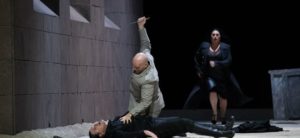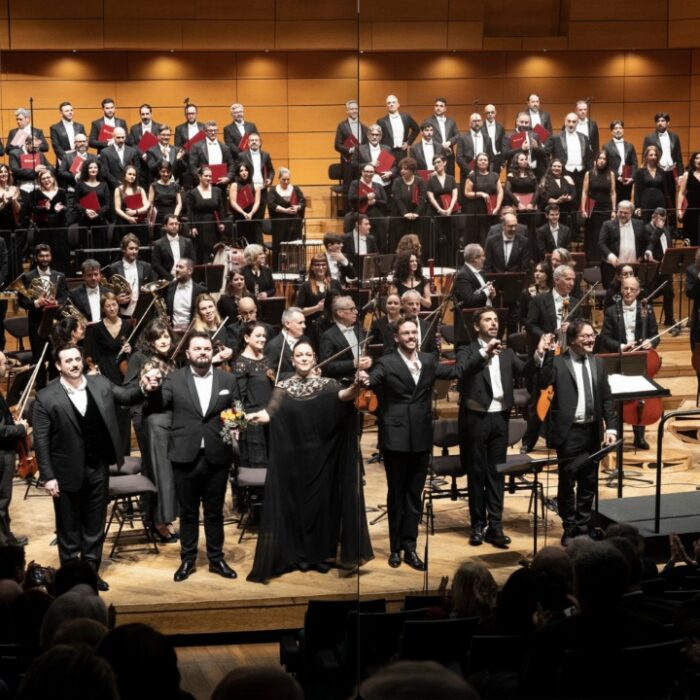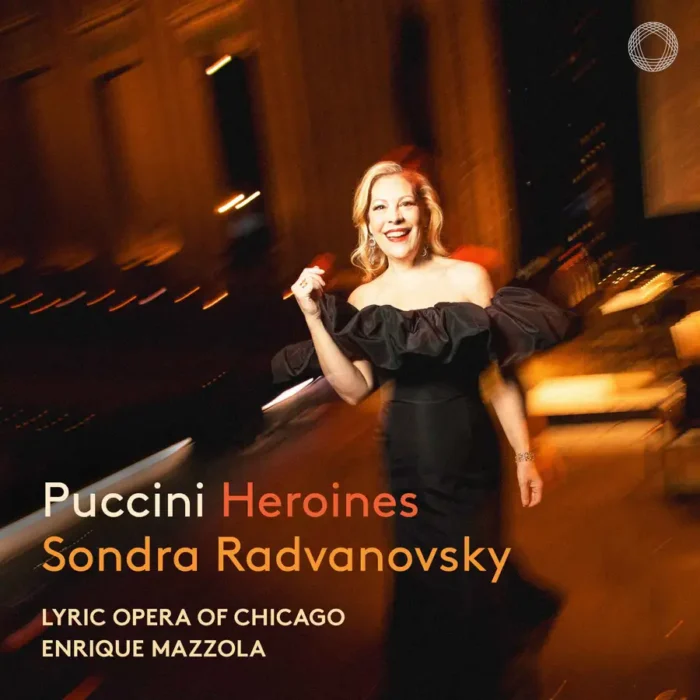
Staatsoper Berlin 2019-20 Review: Carmen
Michael Fabiano & Anita Rachvelishvili Deliver Unforgettable Final Performance In Challenging Times
By Elyse Lyon(Credit: Monika Ritterhaus)
Audience members were already en route to Unter den Linden when the news began to spread on social media: the evening’s performance of “Carmen,” the second in a much-anticipated run of performances, would be the final night of Berlin opera before the city’s concert halls and opera houses were forced to close their doors for at least six weeks.
The news, of course, was not entirely unexpected. Germany’s first Coronavirus deaths had been reported the previous day, and the waves of opera-house closures had just begun to spread beyond Italy.
The weather was fitting for such an announcement. Oppressive grey, drizzling rain, the street lamps glinting on the wet cobblestones and the iconic Fernsehturm disappearing in a bleak haze. At the entrance of the Staatsoper a TV cameraman half-crouched in the rain, filming the evening’s operagoers hurrying into the foyer and shaking the clinging dampness off their umbrellas.
Some of the evening’s attendees remained oblivious to recent developments, bright-eyed and cheerful at the prospect of a star-studded evening. Others wandered the chandeliered halls in a daze, stunned by the sudden barrenness of Berlin’s cultural life and reckoning up their fell swoop of losses.
An hour before, the spring had been packed with excitement. From the Staatsoper alone, premieres of “Idomeneo” and “Così fan tutte;” Pappano and Yuja Wang; a Renée Fleming recital; Barenboim conducting a full Beethoven symphony cycle. The Deutsche Oper and Komische Oper and Philharmonie had been no less full of events to anticipate, their schedules crammed with stars and premieres and all manner of interesting repertoire. Now, at a single stroke, all of that richness was abgesagt.
It was surreal, therefore, to take one’s seat for this final performance. Surprising to peer into the orchestra pit and see the cheerful faces of many orchestra members. A violinist beamed up at Daniel Barenboim as he took his podium, clearly anticipating the prospect of a brilliant musical evening. One wondered whether the musicians had been shielded from the crushing news of the impending closures.
The Staatsoper, despite Coronavirus, was packed from the stalls to the rafters. Only a scattering of seats stood empty. Very few audience members, apparently, had been capable of resisting the allure of this “Carmen” even in the face of a global pandemic.
It should have been difficult, under these circumstances, to concentrate on the opera at hand. Even those audience members still oblivious to the news of the opera houses’ closing were, of course, aware of the threat of the virus. One couldn’t take the U-Bahn without being bombarded by terrifying news: electronic screens flashing death tolls or announcing that Michael Volle had been put under quarantine.
But then, even before the audience had fully settled into their seats and ceased their chatter, Barenboim slashed his baton through the air. Without warning, the first bars of “Carmen” exploded from the pit. And suddenly everything was forgotten: Coronavirus, the devastating cancellations, the bleak sputter of rain in the darkness outside.
Maybe you’d heard “Carmen” a thousand times before. Maybe you’d come to dismiss it as a lowbrow popular opera.
Tonight, however, those first notes were shattering ones. The music erupted with a force that pushed you back in your seat: alive, extraordinary, vital, like a shock of electricity straight to your gut.
A Dreamy Revival
The Staatsoper’s current “Carmen” is a revival of Martin Kušej’s production, originally premiered in 2004. From the first instant, it was stunning: the stage almost barren, the air hazy as if with smoke, a filmy blood-colored scarf fluttering down from the heavens. This scarf would become a central motif, threaded from one scene to another: it was Carmen’s own scarf, draped over her shoulders as she made her initial entrance; it was the rope that would bind her hands after the fight in the cigarette factory; it became, at the end, the matador’s muleta with which Don José taunted Carmen in the moments before he stabbed her.
The scarf’s first role in the staging, however, was as Don José’s blindfold. It was the cloth tied over his eyes as a firing squad prepared to execute him. In Kušej’s production, this execution occurred before the first act of the opera began: the shots of the firing squad rang out with the final note of the prelude, whereupon José fell like a stone, clearly lifeless. The entire plot of the opera, therefore, occurred with its antihero dead. Perhaps the opera was Don José’s dying thoughts, like one of those near-death experiences in which one’s life is said to flash before one’s eyes in an instant.
Kušej’s production, as became clear, played out in some nebulous realm between reality and dreams, between psychological veracity and mythological allegory.
At times, Don José seemed a character out of Wagner, the action of the opera imbued with a metaphorical depth and seriousness often lacking in stagings of “Carmen.” It was easy to liken him to Tannhäuser, caught between a Venus-like Carmen and a pure, self-sacrificing Micaëla. Meanwhile the chorus of cigarette girls, half-naked in Kušej’s production, recalled nothing more than Parsifal’s seductive Flower Maidens.
As the evening progressed, the staging became gradually ever more surreal: the stage populated by ghostly specters, at one point, with bloody wounds in their chests and their torn-out hearts in their hands; later by an exquisitely choreographed hurrying crowd that suddenly froze in its tracks.
Barenboim’s treatment of the score enhanced this dreaminess. His tempi were often languid and otherworldly, though simultaneously never losing a gripping dramatic propulsiveness. Striking contrasts lent the orchestral portions a phantasmagoric quality: surging explosions of musical energy sunk, all at once, into shockingly hushed and subtle passages. The effect was something like a fever dream, overpoweringly wild and languorous by turns, often surprising and perpetually mesmerizing.
Rooted in Realism
Despite the surreal flavor of the production, it was simultaneously deeply rooted in the relatable stuff of human experience. Just as Wagner’s operas, despite their casts of giants and dwarves and immortals, draw much of their power from the penetrating psychological insight that underpins them, Kušej’s dreamy staging was anchored by a gripping emotional realism. While many characters were portrayed more as archetypes than as full-fledged human beings—notably Christiane Karg’s chill, pure Micaëla and Lucio Gallo’s Escamillo, who personified crude machismo—the central characters of Don José and Carmen embodied not only the mythical but also the real.
Much of this realism was conveyed through the extraordinarily sensitive performances of Anita Rachvelishvili as Carmen and Michael Fabiano as Don José.
While Rachvelishvili’s Carmen overwhelmingly emerged less as a strictly human character than as an enigmatic force of nature or a symbol of love, akin to the Venus of “Tannhäuser,” she brought a striking subtlety and humanity to her portrayal. From beginning to end, her performance appeared effortless and absolutely real: shaded with pure volcanic force, at times, but more often with an engrossing array of ever-shifting nuances. The darkly luxurious power of her voice contrasted thrillingly with passages of dreamy, reflective tenderness.
Rachvelishvili’s unmistakable understanding of Carmen’s character made the familiar music and storyline riveting: one was astonished simply by the emotional twists and turns of her portrayal, and how a mood of carefree sauciness could be supplanted, instants later, by apparent terror and desperation.
In the first act, for instance, as Zuniga and Don José bound her hands to arrest her, one keenly felt the immediate impact of this threat to her physical freedom. One moment she sang like a free bird, and the next, the moment her hands were tied, like a wild animal encaged.
One of the most memorable scenes in the evening’s performance was Rachvelishvili’s Act two meeting with Don José. Here, the performance’s underlying psychological realism was most clearly and powerfully in evidence. Fabiano and Rachvelishvili were equally electrifying as they portrayed a gamut of human emotion. As Carmen’s sense of erotic power over Don José gave way to a mortifying sense of betrayal, one acutely felt her wounded heart and the pain that lay beneath her mocking rage toward her lover.
Fabiano, in response, sang “La fleur que tu m’avais jetée” with such ravishing emotion that one found oneself, somehow, on tenterhooks as one waited for Carmen’s answer. Despite knowing the opera’s libretto, it seemed impossible that Carmen could remain unmoved by such a rending expression of passion. Carmen’s implacable retort—”Non, tu ne m’aimes pas!”—was as shocking as if one had never seen the opera before.
Rachvelishvili was no less impressive in the moments when she seemed to embody an otherworldly power with no connection to ordinary human frailty. At times, as in the card-reading scene in the third act, she appeared hypnotized by visions she alone could see, but which she powerfully conveyed to the audience. It was phenomenal to watch her in the grips of such revelations: suddenly unearthly, totally incomprehensible, escaping the grips of one’s understanding like the oiseau rebelle of the Habanera escapes the grips of a lover.
An Emasculated Don José
Don José, through the course of the production, was the sole thoroughly human character—a reflection, perhaps, of the fact that the opera appeared to take place in his dying mind, filtered through his subjective experience.
Fabiano’s command of the role was captivating, a tour de force of phenomenal singing informed by deep psychological and dramatic understanding. Most notable was the complexity of his performance and the complete earnestness he brought to the role.
Though the production began with unmistakable hints of Don José’s sinister qualities—the dragoons in the first scene menaced Micaëla and stripped her clothes off in a premonition of sexual violence, while Don José’s arrest of Carmen was colored by what appeared a nasty erotic thrill at his power over a woman—his character was, nevertheless, largely a convincingly sympathetic one. He seemed a figure of sensitivity and depth, honest and intensely sincere. The apparent guilelessness of his emotional expressions made a marked contrast against Carmen’s changeable heart and penchant for lying.
Through much of the final act, in particular, Fabiano’s performance was utterly disarming. He sat on the stage like a dazed child, stroking his hands across the sand like a toddler might on a playground. Despite knowing the opera’s finale, despite the production’s many reminders that his character was capable of violence and murder, one fully believed his appeals to Carmen. He seemed to wear his heart on his sleeve as he swore that he had not come to threaten Carmen, but solely because he adored her. Once or twice, the intensity of his pleas became disconcerting, verging on unhinged and creepy—but then, an instant later, the naked emotion in his words overwhelmed any sense of danger, and one was won over by the conviction that his character’s intentions were pure.
In the age of #MeToo, some might take issue with this sympathetic portrayal. Some might wish Don José to be portrayed as more recognizably evil, and Carmen more thoroughly human. Nevertheless, the complex dynamic presented here was an astute and relevant one. Violence, after all, is rarely perpetrated by Scarpia-like caricatures of evil. Many women would recognize the truthfulness of Fabiano’s Don José: a figure whose adoration appears genuine, who seems to pose no threat, and whose real danger lies in the very empathy he arouses. Most of us are far weaker than Rachvelishvili’s implacable Carmen, and an appeal as moving as Fabiano’s might easily sway us. Many a woman has been trapped in abusive relationships for similar reasons: swayed by convincing expressions of love, sympathetic to the human vulnerability of a character like Fabiano’s Don José, never entirely cognizant of danger until it becomes too late to escape.
And Fabiano’s Don José, in the end, revealed the true nature of his character. One received the impression that the very sensitivity that made him so winning also fueled his murder of Carmen. Fabiano had played, through the course of the opera, a weak and emotionally fragile Don José, in contrast with the archetypal machismo of Lucio Gallo’s Escamillo and the unbending power of Rachvelishvili’s Carmen. In the final minutes of the opera, he attempted to turn the tables: taunting a suddenly vulnerable Carmen like a matador taunts a bull, visibly relishing his moment of dominance.
At the last, however, it was Carmen who emerged triumphant: still implacable, accepting her death, while Fabiano reeled back from her corpse in horror and tortured shock.
A Fitting Final Opera
As the curtain fell and the Staatsoper resounded with applause, it was difficult to envision a more fulfilling performance for the last night before the opera houses closed. This prematurely final “Carmen” was a delight to please all manner of operagoer, from the first-time attendee to the cynical connoisseur.
An evening that had begun so bleakly, with the catastrophic news Berlin had been fearing, ended with a reminder of the joyfulness that opera is capable of creating. Despite one’s expulsion from the glow of the theater back into the drizzling rain of the outside world, where one’s phones vibrated with torrents of bad news and social media flooded over with the anxieties of musicians suddenly put out of work, one remained, for a while, enveloped in the warmth that every excellent performance engenders.
It was a painful warmth, to be sure: painful enough for operagoers, and immeasurably worse for all those people whose livelihoods are dependent on opera. One meandered home through the damp midnight streets, half uplifted and half weepingly mournful, edging nervously away from strangers, anxiously eyeing the screens on the trains that announced more closures, more cancellations, ever-mounting cases of illness.
Even so, the warmth remained. One kept thinking of Barenboim in the orchestra pit, and the opera’s first notes exploding through the packed and expectant house; of Rachvelishvili and Fabiano, and their brilliant rendering of their roles; of Gallo’s dynamic Escamillo, and Karg’s gorgeously chill Micaëla. Of Adam Kutny’s Moralès, a supporting role sung with breathtaking beauty. Of Jan Martinik’s Zuniga, looming monstrous over the stage, his vocal portrayal as crude and fearsome as the black whip he carried in his hand. Of Serena Sáenz and Alyona Abramova as Mércedès and Frasquita, their girlish frivolity serving as a foil for Carmen’s depth and range, and yet both of them intensely memorable, even scene-stealing in moments, despite the limitations of their roles. Of the half-anonymous orchestra members, their faces and personalities identifiable from one performance to another but their names lost amid the muddle of the extended cast list. Of the chorus members, always visible onstage but unrecognizable behind their costumes and makeup. Of all the people, invisible to the audience, whose contributions we might never know of.
For many opera addicts, live performances are a light in the darkness: evenings that lift us out of ourselves and connect us to something larger. They brighten the bleakness of grinding days of work, provide solace in times of sorrow, create a vibrant community of people across borders and language barriers. For little more than the cost of a fast-food meal, one can purchase a Staatsoper ticket and come away, hours later, replete with music and reawakened to the joys of existence. Now that refuge is lost to us all, at least until the opera houses reopen.
One hopes that this “Carmen” will remain vivid in the memories of everyone who saw it: a reminder of the art form’s great joys, of the riches still left to discover in even the most familiar of operas, and of the necessity to support the artists, now, who have supported us through so many of our dark days, and who now require our support through their own days of dark houses and closures.


